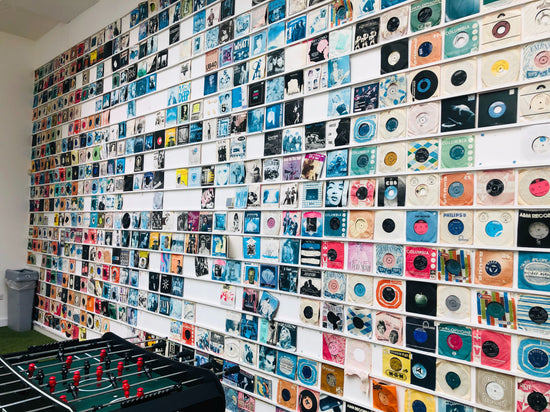Things like being stored in direct sunlight, dust and dirt, moisture, being kept in PVC sleeves, as well as improper storage and handling can all render your records unplayable - so it is important to take care and pay attention to how you are storing your own collection.
In today's article, we'll take a closer look at some of the biggest things you'll want to steer clear of if you are looking to preserve your favourite music for many years to come…
1 - Scratches

The best thing you can do to make sure that your records stay in the best condition possible for the longest amount of time is to avoid any sort of damage to a record's playing surface.
Vinyl records are susceptible to scratches and scrapes due to various reasons. Mishandling, such as dropping or roughly handling records, can lead to visible scratches or deep grooves on the surface. Additionally, improper storage practices contribute significantly to this issue.
Stacking records without protective inner and outer sleeves or placing them in environments where they can rub against each other can cause scratches over time. Furthermore, a damaged or worn-out stylus on a turntable can also scratch the surface of the record as it plays. Even small particles of dust or debris on the record or the stylus itself can result in scratches as the needle moves across the surface during playback.
If you'd like to protect your records to avoid scratches whilst they're being stored, we recommend our polythene archival vinyl inner sleeves.
2 - Heat and Sunlight
When vinyl records are subjected to high temperatures or prolonged exposure to direct sunlight, they become vulnerable to warping, distortion, and irreversible damage. Vinyl is sensitive to heat and can easily warp when exposed to temperatures beyond its tolerance levels.
If records are left in a location where direct sunlight falls on them, the prolonged, intense heat that is generated can accelerate this warping process. The heat causes the vinyl to soften, warp, and take on a new shape that doesn’t conform to the original flat surface needed for proper playback.
Warped records can also cause your player's stylus to skip, jump, or even become stuck in certain grooves, leading to an unpleasant listening experience and potential damage to the stylus or cartridge.
To protect vinyl records from heat and sunlight damage, it's essential to store them in a cool, dry place away from direct sunlight.
Proper storage, such as using inner and outer protective sleeves (and storing records vertically), helps maintain their flat shape and prevents warping.
By taking these precautions, collectors and enthusiasts can ensure the longevity and playability of their vinyl collections, preserving the sound quality and integrity of the records for years to come.
3 - PVC Sleeves
To cut a potentially long (and chemically involved) story short, the gasses that are emitted by PVC materials react harshly with vinyl material, resulting in large amounts of damage to both the record's playing surface (and potentially its sleeve, depending on how it is stored). We've written an entirely separate blog on PVC sleeves, so feel free to take a look!
PVC sleeves are prone to trapping moisture, especially in humid environments. Moisture build-up within the sleeve can create a microclimate around the record itself, promoting conditions that are conducive to mould or mildew growth. This moisture, combined with the chemicals released by the PVC, can potentially damage the vinyl grooves and affect the record's sound quality, too.
To protect vinyl records from potential harm associated with PVC sleeves, it's recommended to use alternative protective options made from materials that are considered safe for long-term record preservation.
Sleeves made from materials like polyethene and paper are preferred as they don't contain PVC or their harsh bi-products, and are less likely to cause adverse reactions or damage to vinyl records and their sleeves. At Atlas Records, we use Density's line of high-quality, polythene outer sleeves, and they work a treat!
4 - Improper Storage

To avoid damaging vinyl records, it's recommended to store them vertically rather than horizontally. Storing records vertically in sturdy crates, shelving units, or record storage solutions designed for this purpose helps distribute weight evenly and prevents warping or excessive pressure on individual records.
Using protective inner sleeves between records helps minimize surface contact and reduces the risk of scratches or abrasions. This storage method also makes it easier to access and retrieve specific records without causing damage during handling.
Moreover, retrieving a specific record from the bottom of a horizontal stack can pose challenges and risks. Moving or sliding records against each other to access one at or near the bottom can result in friction-related damage. Dragging records across each other during retrieval may cause scratches or surface abrasions, compromising the record's condition.
5 - Poor Cleaning Practices
Using harsh or abrasive cleaning methods on vinyl records can cause irreparable damage. Methods such as scrubbing with rough brushes, abrasive cleaning pads, or using harsh chemicals can scratch or gouge the record's playing surface. These scratches interfere with the stylus tracking and can produce unwanted noise, pops, or clicks during playback, degrading the overall sound quality.
Using inappropriate cleaning solutions or chemicals can also cause harm to your records. Substances containing ammonia, or harsh solvents can degrade the vinyl material, leaving residues, cloudiness, or causing chemical reactions that affect sound quality.
It's essential to use specially formulated vinyl record-cleaning solutions that are gentle and safe for the material. We like to use specifically designed vinyl cleaning fluid from Vinyl Shelter for all of the in-house record cleaning we do, take a look at their site here!








